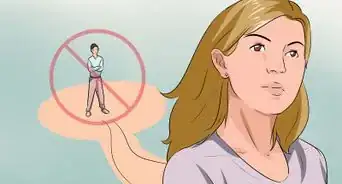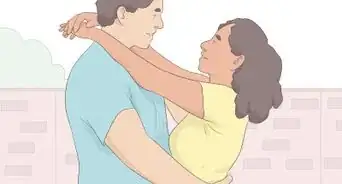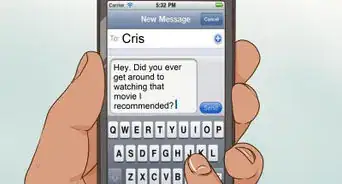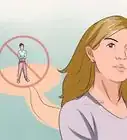This article was co-authored by Trudi Griffin, LPC, MS. Trudi Griffin is a Licensed Professional Counselor in Wisconsin specializing in Addictions and Mental Health. She provides therapy to people who struggle with addictions, mental health, and trauma in community health settings and private practice. She received her MS in Clinical Mental Health Counseling from Marquette University in 2011.
There are 12 references cited in this article, which can be found at the bottom of the page.
This article has been viewed 160,472 times.
Breaking up is hard to do. It’s important to be there for your friend during the aftermath. Listen to what your friend has to say and be sensitive to her feelings. The most important thing you can do for your friend is lend an ear and a shoulder to cry on. Take her out on the town for fun activities to keep her mind off the breakup and provide healthy channels for her stress. Give her time to process her emotions and be patient with her.
Steps
Communicating Effectively With Your Friend
-
1Actively listen to your friend. Active listening is an approach you can use to get the most out of your interaction with your friend.[1] When you’re actively engaged and communicating openly with your friend, you are showing your friend that you understand her feelings and are supportive of her. Often when a breakup occurs, it can lead to feelings of loneliness and self-doubt. As a friend using active listening skills, you are communicating to your friend through actions that she is not alone and that value her thoughts and feelings.
- Look at her directly when she speaks.
- Listen to what she says and use nonverbal communication -- nodding, frowning, smiling -- to let her know you’re engaged.
- Use open-ended questions. For instance, instead of a yes-or-no question like, “Are you sad?” ask “How are you feeling?”
-
2Be careful of your word choice.[2] Even well-meaning statements of sympathy can be misconstrued by a friend in a sensitive state following a breakup. For instance, instead of minimizing her pain by saying, “You’ll be fine,” or “Some things just aren’t meant to be,” say, “I know you’re hurting. You must really miss your ex.”
- Ask for permission when digging deeper.[3] If you want to ask about specifics relating to her feelings or the situation which led to the breakup -- which might be helpful for both of you to better understand it -- get permission before asking your question. “Can I ask you about…” is the best way to do this.
Advertisement -
3Be open-minded.[4] You might not understand why your friend is sad or angry about the breakup, especially if you have a different attitude toward relationships or haven’t had a very serious relationship before. Try to understand why she feels the way she does.
-
4Show empathy.[5] Think back on a nasty breakup you had, if applicable. Use this experience to remember how important it was for you to have the support of your friends when you were coping with a breakup. Do the kind of things for your friend that your friends did for you.
- Don’t minimize your friend’s anxiety by saying patronizing things like, “Don’t worry about that,” or “Everything will work out.”
- Instead, listen to your friend and offer a measured, empathetic response like, “You’re a beautiful person and I believe that even though you’re hurting now, I’m confident you’ll find happiness again.”
- Acknowledge your friend's feelings based upon what she says. For example, your friend may say, "I'll never find another boyfriend/girlfriend..." To acknowledge the feeling behind that statement, you could say, "I understand you're hurt and feeling lonely, but you're not alone. I'm here for you."
-
5Point out your friend’s strengths. Help her see her strengths by pointing out the traits that make her unique. A strong sense of self can help minimize the effects of losing someone who was important to her. Remind her that though she may feel sad without her ex in her life, she is still a whole and complete person on her own.
- For example, compliment your friend on her sweet soccer skills or her awesome artistic abilities. You could also point out how well organized she is or her ability to predict and pull off fashion trends.
Demonstrating Your Support Through Actions
-
1Spend time with your friend.[6] Don’t let your friend suffer through her breakup alone. Invite your other mutual friends to get in on the action. You should all stand in solidarity with your brokenhearted friend.
- Encourage her to be gentle with herself and focus on her well-being.
- Give her a hug, rub her back, and show her that you care and that you are there for her. Sometimes all a friend needs is a shoulder to cry on.
-
2Be trustworthy. When your friend is confiding her most intimate feelings to you, it’s a sign that she trusts you. Don’t betray that trust by blabbing about her breakup and all the details surrounding it to your friends at school, at work, or on social media.
-
3Plan fun activities.[7] Go shopping with your friend. Whether you head to the bookstore, makeup store, or clothing store, getting a new toy or piece of apparel will cheer your friend up (at least temporarily).
- This means taking her out to the movies, bringing her a pizza and watching movies together, going out dancing, or doing whatever hobbies and interests she likes.
- Make a playlist for your friend on Spotify or -- if you’re old-school -- make them a mixtape.
-
4Allow her to process her emotions.[8] If your friend is conscious of her feelings, she will be able to deal with them. If she denies her own feelings, on the other hand, she will continue to be frustrated and harbor resentment against either herself or her ex. This resentment and emotional frustration might manifest later as aggression or hostility against another partner, herself, or her friends.
- Let her cry.[9] It’s important for your friend to externalize her emotions for as long as she likes. Crying is healthy and will make her feel better. The best thing after a breakup is often to cry and feel miserable.
-
5Be patient. People recover from breakups at different rates. While you might not understand why your friend is having a hard time dealing with the breakup, you should be patient. Everyone copes and heals in their own way and at their own pace.
Helping Your Friend Move Forward
-
1Help with the details.[10] Take care of the necessities for your friend. When your friend is grieving the end of her relationship, she might not have the energy for even basic things. Offer to do your friend’s laundry or cook dinner for her.
-
2Develop a plan. Help your friend see the upside of the breakup.[11] After the initial trauma of the breakup has worn off, encourage your friend to think about the benefits of being single. For instance, point out that she no longer has to coordinate with her partner when she wants to travel or move somewhere new.
- Another benefit is that when she’s ready, she gets to meet new people and go on dates again.
- You could point out that she’ll have more time to spend with her family and friends, including you.
- You could make a joke here. Say something witty like, “On the upside, you’ll have more time to spend with me!”
- Show your friend how to make a gratitude list. A gratitude list is a small list written each day in the morning or at night that expresses five good things that happened each day. A gratitude list might begin, “Today was a good day. I am thankful for…” followed by five positive things that made your friend smile or feel good.
-
3Know your own limits.[12] It’s natural to want to be there for your friend when she’s going through a hard time. Ultimately, however, only your friend can choose to deal with her pain and emotions and move beyond the breakup to an emotionally healthier place. Be on the lookout for a friend who is not dealing with a breakup in a healthy way, and prepare yourself for emotional outbursts.
- Your friend might lash out at you despite your helpful attitude and good intentions. If your friend is acting out of character -- being rude, impatient, or distant -- recognize that your friend is just in a sensitive place and needs time to work through the breakup. Don’t take it personally, but do stand up for yourself if your friend crosses the line and starts being really awful toward you.
- Say, “I know you’re going through a hard time right now and I really want to be here for you, but you cannot use your own pain and anger as an excuse to treat me badly.” Leave if necessary.
- Don’t feel that you need to take on the entire burden of your friend’s post-breakup recovery. It’s one thing to let your friend stay over a few nights. It’s another thing entirely to allow your friend to move in with you. Don’t let your friend take advantage of your generosity.
-
4Know when to seek outside help.[13] If your friend spirals into serious depression or is engaging in negative behavior as a result of the breakup, she should seek counseling. Teach your friend to recognize avoidance behaviors.[14] Recommend a therapist if you think it would help.
- In the face of a serious breakup, people often turn to drugs and alcohol. However, they might also cope in other, equally destructive ways, including binging on food, working nonstop, or engaging in excessive shopping. Your friend should see a therapist if she begins doing anything extreme.
- Therapy can be good for many reasons. The end of a relationship (especially a long-term relationship), can be extremely painful and difficult to deal with. Relationships often end because one or both individuals were unable to identify and confront issues from their pasts that led to unhealthy relationship habits, which in turn caused the breakup.
- If your friend was involved in an unhealthy relationship where her identity was based on the approval of the person she was dating, or the relationship was based on manipulation and control, it could be a sign of other issues.
- Talking with a trained therapist can help your friend cope with her breakup and better understand her own actions and beliefs to ensure the past doesn’t repeat itself in her next relationship. It can also help your friend identify what healthy relationships look like so future relationships will be better.
Warnings
- Don't yell at her or blame her for the breakup.⧼thumbs_response⧽
- Be careful of what you say about your friend’s ex. There's a chance they may get back together someday.⧼thumbs_response⧽
References
- ↑ https://www.psychologytoday.com/blog/the-older-dad/201409/active-listening-is-key-great-interactions
- ↑ http://www.marieclaire.com/sex-love/a6101/how-to-cheer-up-friend/
- ↑ https://www.psychologytoday.com/blog/the-older-dad/201409/active-listening-is-key-great-interactions
- ↑ https://www.psychologytoday.com/blog/the-older-dad/201409/active-listening-is-key-great-interactions
- ↑ http://www.healthguidance.org/entry/16776/1/How-to-Help-a-Friend-Through-a-Breakup.html
- ↑ https://books.google.com/books?id=3oqNx08XZ_MC&lpg=PR1&pg=PA13#v=onepage&q&f=false
- ↑ https://books.google.com/books?id=3oqNx08XZ_MC&lpg=PR1&pg=PA13#v=onepage&q&f=false
- ↑ https://books.google.com/books?id=3oqNx08XZ_MC&lpg=PR1&pg=PA11#v=onepage&q&f=false
- ↑ http://hellogiggles.com/20-ways-comfort-friend-break/
- ↑ https://www.psychologytoday.com/blog/me-we/201402/4-ways-be-good-friend-during-friends-breakup
- ↑ http://www.healthguidance.org/entry/16776/1/How-to-Help-a-Friend-Through-a-Breakup.html
- ↑ https://www.psychologytoday.com/blog/me-we/201402/4-ways-be-good-friend-during-friends-breakup
- ↑ https://books.google.com/books?id=3oqNx08XZ_MC&lpg=PR1&pg=PA8#v=onepage&q&f=false
- ↑ https://books.google.com/books?id=3oqNx08XZ_MC&lpg=PR1&pg=PA14#v=onepage&q&f=false
About This Article
Coping with a breakup is never easy, but with a little support, you’ll be able to help your friend feel better. If your friend just broke up with their partner, they probably need a listening ear. Let them vent and explain how they're feeling. While you might be tempted to tell them they'll be fine, it’s important that you don’t minimize their pain, so maybe say something like, “I can tell you’re hurting. You must be really missing your ex right now.” When your friend’s feeling a bit better, plan some fun activities to take their mind off the breakup, like shopping, going to dinner, or having a movie night in. Remember that people recover from breakups at different rates, so it may take some time for them to be back to their old self. To learn when you should help your friend seek outside help for depression, read on.
-Step-1-Version-3.webp)
-Step-2-Version-3.webp)
-Step-3-Version-3.webp)
-Step-4-Version-3.webp)

-Step-5-Version-3.webp)
-Step-6-Version-3.webp)
-Step-7-Version-2.webp)
-Step-8-Version-2.webp)
-Step-9-Version-2.webp)
-Step-10-Version-2.webp)
-Step-11-Version-2.webp)
-Step-12-Version-2.webp)
-Step-13-Version-2.webp)





























































